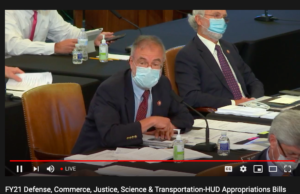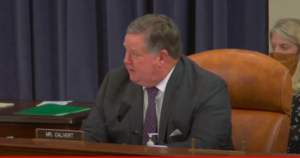
The border wall under construction.
UPDATED from final vote WASHINGTON: Even as House appropriators of both parties rose this morning to praise retiring Rep. Pete Visclosky for his bipartisan stewardship of the annual defense funding bill, several Republicans waved the red flag of a presidential veto over a handful of bitterly partisan provisions.
But the Democrat-controlled committee passed the $694.6 billion spending bill by 30 votes to 22. While it now goes to the House floor, the chamber’s rules strongly empower the majority and make minority attempts to amend the bill a losing battle.
The biggest stumbling block for Republicans? A provision that would prevent President Trump from using emergency powers to divert Defense Department funding to building a wall on the southern border. Trump moved $10 billion this way last year; last month, a federal court declared $2.5 billion of that transfer illegal. The matter is likely to be decided by the Supreme Court.

Rep. Andy Harris addresses the House Appropriations Committee this morning
Republican Andy Harris sought to strike the wall-ban language, Section 8134, as well as another provision (Sec. 8136) limiting use of troops on the border unless the Defense Department budget gets reimbursed for the expense. “They are too broadly written,” he said. “They go far beyond the wall and they could impede… the war on fentanyl.”
Since the bill would cover the whole 2021 fiscal year, it would “tie the next administration’s hands, whoever it is,” Harris said. “[Section] 8134 does not just prohibit a wall. It prohibits any funds on border security infrastructure.
“Some people don’t like this president; I fully get it,” he said. “But this bill may not just pertain to this president.”
Harris got strong support from other Republicans, but Democrats didn’t buy the argument they might be tying hands of a President Biden. Harris’s amendment failed, 31 votes to 21.
Partisan Divides
That’s not the only partisan controversy the House Appropriations Committee faced this morning:
- Democratic Rep. Barbara Lee introduced amendments to overturn the 2001 Authorization for the Use of Military Force, used to justify airstrikes and interventions worldwide; to overturn the 2002 AUMF regarding Iraq, which could also justify action against Iran; and to ban offensive action against Iran.
- Republican Rep. Mario Díaz-Balart introduced an amendment that would prevent the federal government – including a potential future Biden Administration – from closing the Guantanamo Bay prison and transferring the 40 terrorist suspects there.
- Rep. Harris sought to require hospitals participating in the military’s TRICARE program to have clear policies to save children born alive after an abortion, which Democrats denounced as a back-door attack on women’s right to choose.
All three of Lee’s amendments passed, and Republican ones failed, on largely party-line votes — twice by the same 30-22 split as the overall bill.
The bill also includes provisions to rename military bases that currently honor Confederate generals. Although no amendment came up on this issue, Trump has threatened to veto any such legislation.
But it was the border wall that sparked a running battle throughout the markup session.

Rep. Pete Visclosky, outgoing chairman of the House Appropriations subcommittee on defense.
Visclosky, who started as a Hill staffer and then spent 35 years in Congress, framed the issue as one of constitutional prerogative, a fight against “habitual abuses” by the executive branch that goes well beyond the border wall to other cases of diverting funds away from their legally appropriated purpose.
The defense appropriations bill “contains several provisions to rein in the [Defense] Department’s now ritual redirection of funding in contravention of congressional intent,” Visclosky said. “I believe the department’s actions are unlawful….These actions have irreparably damaged the department’s credibility with the committee.”
“In recent years, department leadership has not missed an opportunity to claim 3 to 5 percent annual real growth in the defense budget is necessary to support the National Defense Strategy,” Visclosky growled. “At the same time, those same leaders facilitated the transfer of nearly $10 billion to non-defense activities not enumerated in their National Defense Strategy.
“They also have the temerity to repeatedly request more flexibility from Congress for executing [their] budget and for reprogramming authority,” he said. “The sense of entitlement in these actions is appalling.”
Visclosky’s Republican colleagues – who were otherwise full of praise for their retiring Democratic colleague – were swift to object. His GOP counterpart on the defense subcommittee, ranking member Ken Calvert, lamented that, despite the many vital provisions in the defense funding bill, “I cannot support it in its current form.

Rep. Ken Calvert
“It is so unfortunate that important initiatives that have broad support are overshadowed by political issues,” Calvert said. “While this is a very strong bill, there are numerous provisions, like the prohibition on funding for the southwest border wall construction and limitations on DoD’s [funding] transfer authorities, that will draw a veto threat from the administration.” That could lead — as it did last year — to a stopgap Continuing Resolution that funds the Defense Department at last year’s spending levels, with no provision to start new programs or cancel problematic ones, a notoriously wasteful practice.
“I want to work with you so we can have a bill that can be signed when it gets to the president’s desk,” Calvert said. “There’s a lot of things that are going to happen between now and then.”
The bill must not only pass the Democratic-controlled House of Representatives but also be reconciled in conference with whatever comes out of the Republican-controlled Senate. The Senate appropriators haven’t yet released a draft defense funding bill. While the House is traditionally considered the more democratic chamber, it’s actually the Senate’s rules that give far more say to the minority — which in their case is the Democrats.

Rep. Kay Granger
The top Republican on the House Appropriations Committee, Kay Granger of Fort Worth, also said she could not support the bill in its current form, citing provisions on renaming bases and on aid to Ukraine – another area where Democrats seek to limit the Trump Administration’s options – as well as the border wall and funding transfer authorities.
“This bill must become law and I am concerned that many of the provisions would draw a veto threat,” Granger said. “These provisions include limiting funds to construct a wall or fence at the border, renaming military installations, exempting the Ukraine security assistance initiative from the normal OMB process, and continuing to limit the DoD’s budget flexibility. We have to drop or modify any controversial language that could jeopardize its chances of being signed into law. It’s too important for that.”
Senate passes $95 billion foreign aid bill, as DoD eyes next Ukraine weapons package
Additional aid for Ukraine could be made available “within days” said Pentagon Press Secretary Maj. Gen. Pat Ryder earlier today.


























